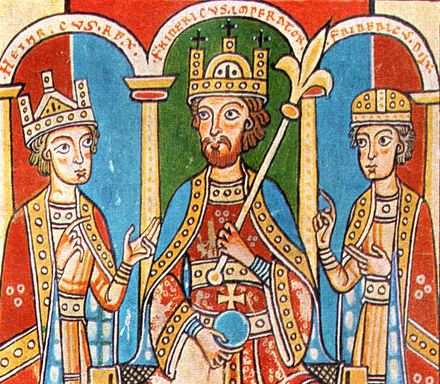Editor’s Note: The following comprises the twelfth chapter of The Holy Roman Empire, by James Bryce (published 1871). All spelling in the original.
(Continued from Part 11)
CHAPTER XII
IMPERIAL TITLES AND PRETENSIONS
The era of the Hohenstaufen is perhaps the fittest point at which to turn aside from the narrative history of the Empire to speak shortly of the legal position which it professed to hold to the rest of Europe, as well as of certain duties and observances which throw a light upon the system it embodied. This is not indeed the era of its greatest power: that was already past. Nor is it conspicuously the era when its ideal dignity stood highest: for that remained scarcely impaired till three centuries had passed away. But it was under the Hohenstaufen, owing partly to the splendid abilities of the princes of that famous line, partly to the suddenly-gained ascendancy of the Roman law, that the actual power and the theoretical influence of the Empire most fully coincided. There can therefore be no better opportunity for noticing the titles and claims by which it announced itself the representative of Rome’s universal dominion, and for collecting the various instances in which they were (either before or after Frederick’s time) more or less admitted by the other states of Europe.
The territories over which Barbarossa would have declared his jurisdiction to extend may be classed under four heads:—
First, the German lands, in which, and in which alone, the Emperor was, up till the death of Frederick the Second, effective sovereign.
Second, the non-German districts of the Holy Empire, where the Emperor was acknowledged as sole monarch, but in practice little regarded.
Third, certain outlying countries, owing allegiance to the Empire, but governed by kings of their own.
Fourth, the other states of Europe, whose rulers, while in most cases admitting the superior rank of the Emperor, were virtually independent of him.
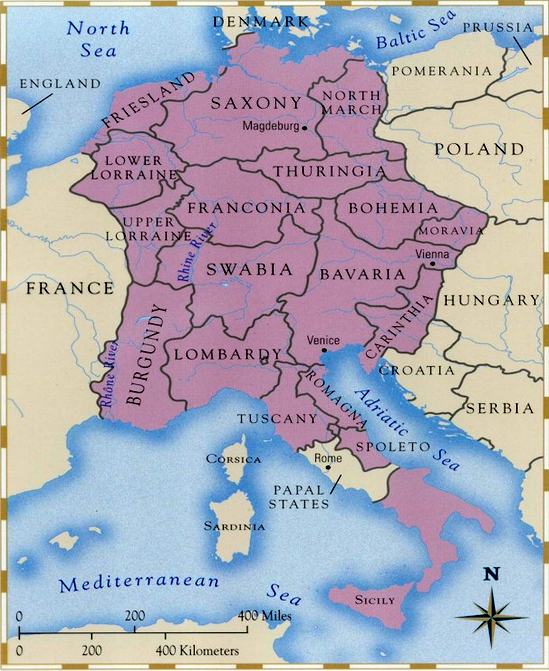
Limits of the Empire
Thus within the actual boundaries of the Holy Empire were included only districts coming under the first and second of the above classes, i.e. Germany, the northern half of Italy, and the kingdom of Burgundy or Arles—that is to say, Provence, Dauphiné, the Free County of Burgundy (Franche Comté), and Western Switzerland. Lorraine, Alsace, and a portion of Flanders were of course parts of Germany. To the north-east, Bohemia and the Slavic principalities in Mecklenburg and Pomerania were as yet not integral parts of its body, but rather dependent outliers. Beyond the march of Brandenburg, from the Oder to the Vistula, dwelt pagan Lithuanians or Prussians, free till the establishment among them of the Teutonic knights.
Hungary
Hungary had owed a doubtful allegiance since the days of Otto I. Gregory VII had claimed it as a fief of the Holy See; Frederick wished to reduce it completely to subjection, but could not overcome the reluctance of his nobles. After Frederick II, by whom it was recovered from the Mongol hordes, no imperial claims were made for so many years that at last they became obsolete, and were confessed to be so by the Constitution of Augsburg, A.D. 1566.
Poland
Under Duke Misico, Poland had submitted to Otto the Great, and continued, with occasional revolts, to obey the Empire, till the beginning of the Great Interregnum (as it is called) in 1254. Its duke was present at the election of Richard, A.D. 1258. Thereafter Primislas called himself king, in token of emancipation, and the country became independent, though some of its provinces were long afterwards reunited to the German state. Silesia, originally Polish, was attached to Bohemia by Charles IV, and so became part of the Empire; Posen and Galicia were seized by Prussia and Austria, A.D. 1772. Down to her partition in that year, the constitution of Poland remained a copy of that which had existed in the German kingdom in the twelfth century.
Denmark
Lewis the Pious had received the homage of the Danish king Harold, on his baptism at Mentz, A.D. 826; Otto the Great’s victories over Harold Blue Tooth made the country regularly subject, and added the march of Schleswig to the immediate territory of the Empire: but the boundary soon receded to the Eyder, on whose banks might be seen the inscription,—
‘Eidora Romani terminus imperii.’
King Peter attended at Frederick I’s coronation, to do homage, and receive from the Emperor, as suzerain, his own crown. Since the Interregnum Denmark has been always free.
France
Otto the Great was the last Emperor whose suzerainty the French kings had admitted; nor were Henry VI and Otto IV successful in their attempts to enforce it. Boniface VIII, in his quarrel with Philip the Fair, offered the French throne, which he had pronounced vacant, to Albert I; but the wary Hapsburg declined the dangerous prize. The precedence, however, which the Germans continued to assert, irritated Gallic pride, and led to more than one contest. Blondel denies the Empire any claim to the Roman name; and in A.D. 1648 the French envoys at Münster refused for some time to admit what no other European state disputed. Till recent times the title of the Archbishop of Treves, ‘Archicancellarius per Galliam atque regnum Arelatense,’ preserved the memory of an obsolete supremacy which the constant aggressions of France might seem to have reversed.
Sweden
No reliance can be placed on the author who tells us that Sweden was granted by Frederick I to Waldemar the Dane; the fact is improbable, and we do not hear that such pretensions were ever put forth before or after.
Spain
Nor does it appear that authority was ever exercised by any Emperor in Spain. Nevertheless the choice of Alfonso X by a section of the German electors, in A.D. 1258, may be construed to imply that the Spanish kings were members of the Empire. And when, A.D. 1053, Ferdinand the Great of Castile had, in the pride of his victories over the Moors, assumed the title of ‘Hispaniæ Imperator,’ the remonstrance of Henry III declared the rights of Rome over the Western provinces indelible, and the Spaniard, though protesting his independence, was forced to resign the usurped dignity.
England
No act of sovereignty is recorded to have been done by any of the Emperors in England, though as heirs of Rome they might be thought to have better rights over it than over Poland or Denmark. There was, however, a vague notion that the English, like other kingdoms, must depend on the Empire: a notion which appears in Conrad III’s letter to John of Constantinople; and which was countenanced by the submissive tone in which Frederick I was addressed by the Plantagenet Henry II. English independence was still more compromised in the next reign, when Richard I, according to Hoveden, ‘Consilio matris suæ deposuit se de regno Angliæ et tradidit illud imperatori (Henrico VIto) sicut universorum domino.’ But as Richard was at the same time invested with the kingdom of Arles by Henry VI, his homage may have been for that fief only; and it was probably in that capacity that he voted, as a prince of the Empire, at the election of Frederick II. The case finds a parallel in the claims of England over the Scottish king, doubtful, to say the least, as regards the domestic realm of the latter, certain as regards Cumbria, which he had long held from the Southern crown. But Germany had no Edward I. Henry VI is said at his death to have released Richard from his submission (this too may be compared with Richard’s release to the Scottish William the Lion), and Edward II declared, ‘regnum Angliæ ab omni subiectione imperiali esse liberrimum.’ Yet the idea survived: the Emperor Lewis the Bavarian, when he named Edward III his vicar in the great French war, demanded, though in vain, that the English monarch should kiss his feet. Sigismund, visiting Henry V at London, before the meeting of the council of Constance, was met by the Duke of Gloucester, who, riding into the water to the ship where the Emperor sat, required him, at the sword’s point, to declare that he did not come purposing to infringe on the king’s authority in the realm of England. One curious pretension of the imperial crown called forth many protests. It was declared by civilians and canonists that no public notary could have any standing, or attach any legality to the documents he drew, unless he had received his diploma from the Emperor or the Pope. A strenuous denial of a doctrine so injurious was issued by the parliament of Scotland under James III.
Naples
The kingdom of Naples and Sicily, although of course claimed as a part of the Empire, was under the Norman dynasty (A.D. 1060-1189) not merely independent, but the most dangerous enemy of the German power in Italy. Henry VI, the son and successor of Barbarossa, obtained possession of it by marrying Constantia the last heiress of the Norman kings. But both he and Frederick II treated it as a separate patrimonial state, instead of incorporating it with their more northerly dominions. After the death of Conradin, the last of the Hohenstaufen, it passed away to an Angevin, then to an Aragonese dynasty, continuing under both to maintain itself independent of the Empire, nor ever again, except under Charles V, united to the Germanic crown.
Venice
One spot in Italy there was whose singular felicity of situation enabled her through long centuries of obscurity and weakness, slowly ripening into strength, to maintain her freedom unstained by any submission to the Frankish and Germanic Emperors. Venice glories in deducing her origin from the fugitives who escaped from Aquileia in the days of Attila: it is at least probable that her population never received an intermixture of Teutonic settlers, and continued during the ages of Lombard and Frankish rule in Italy to regard the Byzantine sovereigns as the representatives of their ancient masters. In the tenth century, when summoned to submit by Otto, they had said, ‘We wish to be the servants of the Emperors of the Romans’ (the Constantinopolitan), and though they overthrew this very Eastern throne in A.D. 1204, the pretext had served its turn, and had aided them in defying or evading the demands of obedience made by the Teutonic princes. Alone of all the Italian republics, Venice never, down to her extinction by France and Austria in A.D. 1796, recognized within her walls any secular authority save her own.
The East
The kings of Cyprus and Armenia sent to Henry VI to confess themselves his vassals and ask his help. Over remote Eastern lands, where Frankish foot had never trod, Frederick Barbarossa asserted the indestructible rights of Rome, mistress of the world. A letter to Saladin, amusing from its absolute identification of his own Empire with that which had sent Crassus to perish in Parthia, and had blushed to see Mark Antony ‘consulum nostrum’ at the feet of Cleopatra, is preserved by Hoveden: it bids the Soldan withdraw at once from the dominions of Rome, else will she, with her new Teutonic defenders, of whom a pompous list follows, drive him from them with all her ancient might.
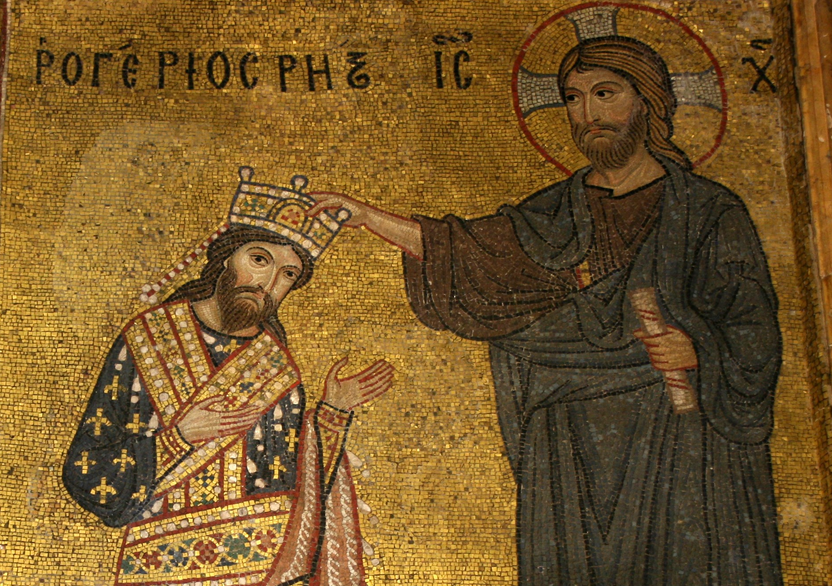
The Byzantine Emperors
Unwilling as were the great kingdoms of Western Europe to admit the territorial supremacy of the Emperor, the proudest among them never refused, until the end of the Middle Ages, to recognize his precedence and address him in a tone of respectful deference. Very different was the attitude of the Byzantine princes, who denied his claim to be an Emperor at all. The separate existence of the Eastern Church and Empire was not only, as has been said above, a blemish in the title of the Teutonic sovereigns; it was a continuing and successful protest against the whole system of an Empire Church of Christendom, centering in Rome, ruled by the successor of Peter and the successor of Augustus. Instead of the one Pope and one Emperor whom mediæval theory presented as the sole earthly representatives of the invisible head of the Church, the world saw itself distracted by the interminable feud of rivals, each of whom had much to allege on his behalf.
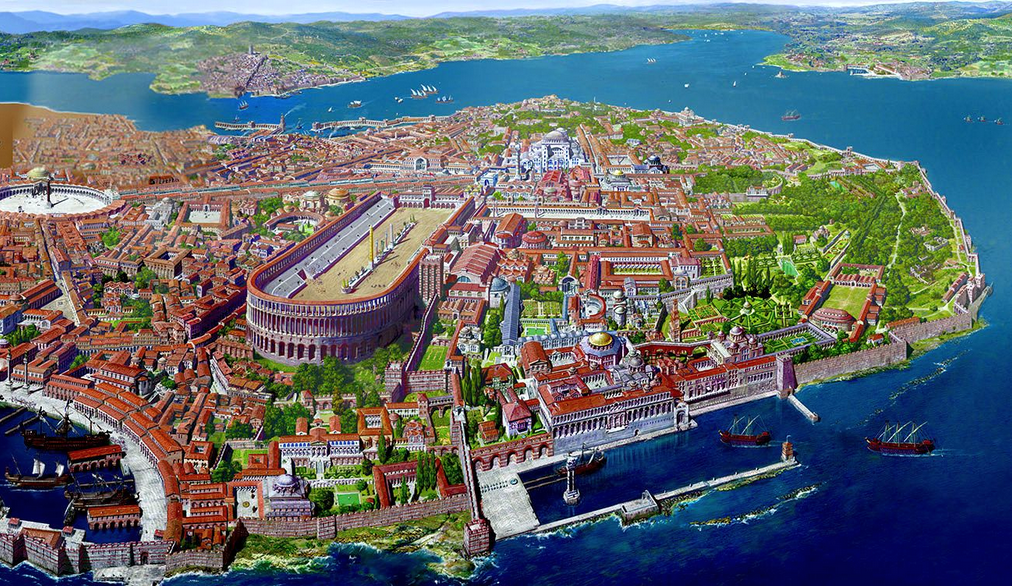
Rivalry of the two Empires
It was easy for the Latins to call the Easterns schismatics and their Emperor an usurper, but practically it was impossible to dethrone him or reduce them to obedience: while even in controversy no one could treat the pretensions of communities who had been the first to embrace Christianity and retained so many of its most ancient forms, with the contempt which would have been felt for any Western sectaries. Seriously, however, as the hostile position of the Greeks seems to us to affect the claims of the Teutonic Empire, calling in question its legitimacy and marring its pretended universality, those who lived at the time seem to have troubled themselves little about it, finding themselves in practice seldom confronted by the difficulties it raised. The great mass of the people knew of the Greeks not even by name; of those who did, the most thought of them only as perverse rebels, Samaritans who refused to worship at Jerusalem, and were little better than infidels. The few ecclesiastics of superior knowledge and insight had their minds preoccupied by the established theory, and accepted it with too intense a belief to suffer anything else to come into collision with it: they do not seem to have even apprehended all that was involved in this one defect. Nor, what is still stranger, in all the attacks made upon the claims of the Teutonic Empire, whether by its Papal or its French antagonists, do we find the rival title of the Greek sovereigns adduced in argument against it. Nevertheless, the Eastern Church was then, as she is to this day, a thorn in the side of the Papacy; and the Eastern Emperors, so far from uniting for the good of Christendom with their Western brethren, felt towards them a bitter though not unnatural jealousy, lost no opportunity of intriguing for their evil, and never ceased to deny their right to the imperial name. The coronation of Charles was in their eyes an act of unholy rebellion; his successors were barbarian intruders, ignorant of the laws and usages of the ancient state, and with no claim to the Roman name except that which the favour of an insolent pontiff might confer. The Greeks had themselves long since ceased to use the Latin tongue, and were indeed become more than half Orientals in character and manners. But they still continued to call themselves Romans, and preserved most of the titles and ceremonies which had existed in the time of Constantine or Justinian. They were weak, although by no means so weak as modern historians have been till lately wont to paint them, and the weaker they grew the higher rose their conceit, and the more did they plume themselves upon the uninterrupted legitimacy of their crown, and the ceremonial splendour wherewith custom had surrounded its wearer. It gratified their spite to pervert insultingly the titles of the Frankish princes. Basil the Macedonian reproached Lewis II with presuming to use the name of ‘Basileus,’ to which Lewis retorted that he was as good an emperor as Basil himself, but that, anyhow, Basileus was only the Greek for rex, and need not mean ‘Emperor’ at all. Nicephorus would not call Otto I anything but ‘King of the Lombards,’ Conrad III was addressed by Calo-Johannes as ‘amice imperii mei Rex;’ Isaac Angelus had the impudence to style Frederick I ‘chief prince of Alemannia.’ The great Emperor, half-resentful, half-contemptuous, told the envoys that he was ‘Romanorum imperator,’ and bade their master call himself ‘Romaniorum’ from his Thracian province. Though these ebullitions were the most conclusive proof of their weakness, the Byzantine rulers sometimes planned the recovery of their former capital, and seemed not unlikely to succeed under the leadership of the conquering Manuel Comnenus. He invited Alexander III, then in the heat of his strife with Frederick, to return to the embrace of his rightful sovereign, but the prudent pontiff and his synod courteously declined. The Greeks were, however, too unstable and too much alienated from Latin feeling to have held Rome, could they even have seduced her allegiance. A few years later they were themselves the victims of the French and Venetian crusaders.
Dignities and titles
Though Otto the Great and his successors had dropped all titles save their highest (the tedious lists of imperial dignities were happily not yet in being), they did not therefore endeavour to unite their several kingdoms, but continued to go through four distinct coronations at the four capitals of their Empire. These are concisely given in the verses of Godfrey of Viterbo, a notary of Frederick’s household:—
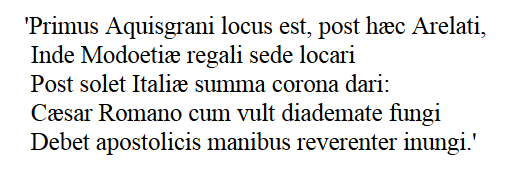
The four crowns
By the crowning at Aachen, the old Frankish capital, the monarch became ‘king;’ formerly ‘king of the Franks,’ or, ‘king of the Eastern Franks;’ now, since Henry II’s time, ‘king of the Romans, always Augustus.’ At Monza, (or, more rarely, at Milan) in later times, at Pavia in earlier times, he became king of Italy, or of the Lombards; at Rome he received the double crown of the Roman Empire, ‘double,’ says Godfrey, as ‘urbis et orbis:’—
‘Hoc quicunque tenet, summus in orbe sedet;’
though others hold that, uniting the mitre to the crown, it typifies spiritual as well as secular authority. The crown of Burgundy or the kingdom of Arles, first gained by Conrad II, was a much less splendid matter, and carried with it little effective power. Most Emperors never assumed it at all, Frederick I not till late in life, when an interval of leisure left him nothing better to do. These four crowns furnish matter of endless discussion to the old writers; they tell us that the Roman was golden, the German silver, the Italian iron, the metal corresponding to the dignity of each realm. Others say that that of Aachen is iron, and the Italian silver, and give elaborate reasons why it should be so. There seems to be no doubt that the allegory created the fact, and that all three crowns were of gold, though in that of Italy there was and is inserted a piece of iron, a nail, it was believed, of the true Cross.
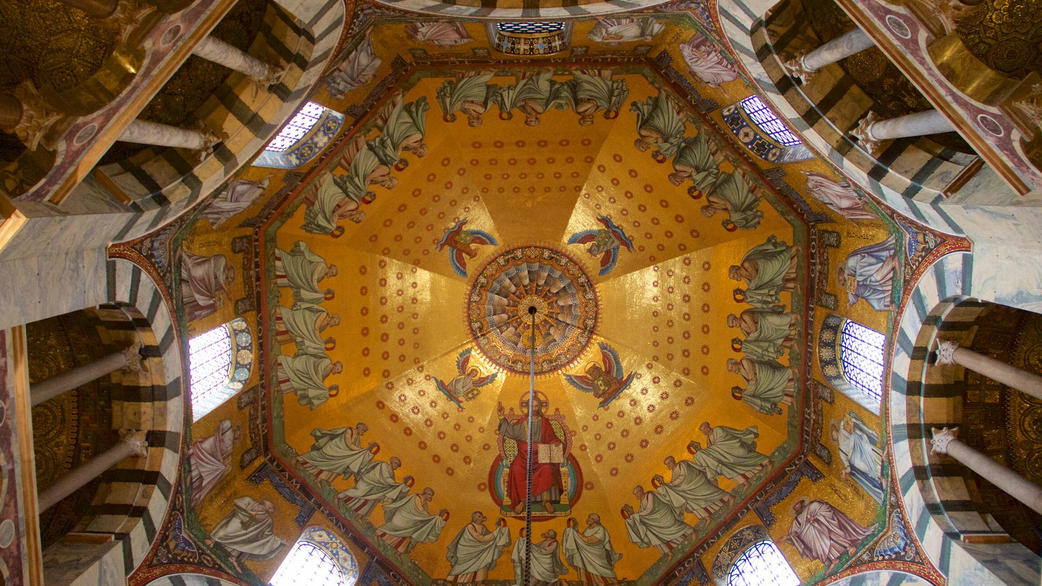
Meaning of the four coronations
Why, it may well be asked, seeing that the Roman crown made the Emperor ruler of the whole habitable globe, was it thought necessary for him to add to it minor dignities which might be supposed to have been already included in it? The reason seems to be that the imperial office was conceived of as something different in kind from the regal, and as carrying with it not the immediate government of any particular kingdom, but a general suzerainty over and right of controlling all. Of this a pertinent illustration is afforded by an anecdote told of Frederick Barbarossa. Happening once to inquire of the famous jurists who surrounded him whether it was really true that he was ‘lord of the world,’ one of them simply assented, another, Bulgarus, answered, ‘Not as respects ownership.’ In this dictum, which is evidently conformable to the philosophical theory of the Empire, we have a pointed distinction drawn between feudal sovereignty, which supposes the prince original owner of the soil of his whole kingdom, and imperial sovereignty, which is irrespective of place, and exercised not over things but over men, as God’s rational creatures. But the Emperor, as has been said already, was also the East Frankish king, uniting in himself, to use the legal phrase, two wholly distinct ‘persons,’ and hence he might acquire more direct and practically useful rights over a portion of his dominions by being crowned king of that portion, just as a feudal monarch was often duke or count of lordships whereof he was already feudal superior; or, to take a better illustration, just as a bishop may hold livings in his own diocese. That the Emperors, while continuing to be crowned at Milan and Aachen, did not call themselves kings of the Lombards and of the Franks, was probably merely because these titles seemed insignificant compared to that of Roman Emperor.
‘Emperor’ not assumed till the Roman coronation
In this supreme title, as has been said, all lesser honours were blent and lost, but custom or prejudice forbade the German king to assume it till actually crowned at Rome by the Pope. Matters of phrase and title are never unimportant, least of all in an age ignorant and superstitiously antiquarian: and this restriction had the most important consequences.
Origin and results of this practice
The first barbarian kings had been tribe-chiefs; and when they claimed a dominion which was universal, yet in a sense territorial, they could not separate their title from the spot which it was their boast to possess, and by virtue of whose name they ruled. ‘Rome,’ says the biographer of St. Adalbert, ‘seeing that she both is and is called the head of the world and the mistress of cities, is alone able to give to kings imperial power, and since she cherishes in her bosom the body of the Prince of the Apostles, she ought of right to appoint the Prince of the whole earth.’ The crown was therefore too sacred to be conferred by any one but the supreme Pontiff, or in any city less august than the ancient capital. Had it become hereditary in any family, Lothar I’s, for instance, or Otto’s, this feeling might have worn off; as it was, each successive transfer, to Guido, to Otto, to Henry II, to Conrad the Salic, strengthened it. The force of custom, tradition, precedent, is incalculable when checked neither by written rules nor free discussion. What sheer assertion will do is shewn by the success of a forgery so gross as the Isidorian decretals. No arguments are needed to discredit the alleged decree of Pope Benedict VIII, which prohibited the German prince from taking the name or office of Emperor till approved and consecrated by the pontiff, but a doctrine so favourable to papal pretensions was sure not to want advocacy; Hadrian IV proclaims it in the broadest terms, and through the efforts of the clergy and the spell of reverence in the Teutonic princes, it passed into an unquestioned belief. That none ventured to use the title till the Pope conferred it, made it seem in some manner to depend on his will, enabled him to exact conditions from every candidate, and gave a colour to his pretended suzerainty. Since by feudal theory every honour and estate is held from some superior, and since the divine commission has been without doubt issued directly to the Pope, must not the whole earth be his fief, and he the lord paramount, to whom even the Emperor is a vassal? This argument, which derived considerable plausibility from the rivalry between the Emperor and other monarchs, as compared with the universal and undisputed authority of the Pope, was a favourite with the high sacerdotal party: first distinctly advanced by Hadrian IV, when he set up the picture representing Lothar’s homage, which had so irritated the followers of Barbarossa, though it had already been hinted at in Gregory VII’s gift of the crown to Rudolf of Suabia, with the line,—
‘Petra dedit Petro, Petrus diadema Rudolfo.’
Nor was it only by putting him at the pontiff’s mercy that this dependence of the imperial name on a coronation in the city injured the German sovereign. With strange inconsistency it was not pretended that the Emperor’s rights were any narrower before he received the rite: he could summon synods, confirm papal elections, exercise jurisdiction over the citizens: his claim of the crown itself could not, at least till the times of the Gregorys and the Innocents, be positively denied. For no one thought of contesting the right of the German nation to the Empire, or the authority of the electoral princes, strangers though they were, to give Rome and Italy a master. The republican followers of Arnold of Brescia might murmur, but they could not dispute the truth of the proud lines in which the poet who sang the glories of Barbarossa, describes the result of the conquest of Charles the Great:—
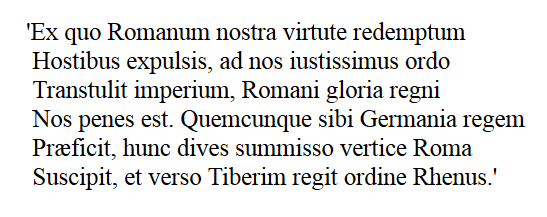
But the real strength of the Teutonic kingdom was wasted in the pursuit of a glittering toy: once in his reign each Emperor undertook a long and dangerous expedition, and dissipated in an inglorious and ever to be repeated strife the forces that might have achieved conquest elsewhere, or made him feared and obeyed at home.

The title ‘Holy Empire’
At this epoch appears another title, of which more must be said. To the accustomed ‘Roman Empire’ Frederick Barbarossa adds the epithet of ‘Holy.’ Of its earlier origin, under Conrad II (the Salic), which some have supposed, there is no documentary trace, though there is also no proof to the contrary. So far as is known it occurs first in the famous Privilege of Austria, granted by Frederick in the fourth year of his reign, the second of his empire, ‘terram Austriæ quæ clypeus et cor sacri imperii esse dinoscitur:’ then afterwards, in other manifestos of his reign; for example, in a letter to Isaac Angelus of Byzantium, and in the summons to the princes to help him against Milan: ‘Quia … urbis et orbis gubernacula tenemus … sacro imperio et divæ reipublicæ consulere debemus;’ where the second phrase is a synonym explanatory of the first. Used occasionally by Henry VI and Frederick II, it is more frequent under their successors, William, Richard, Rudolf, till after Charles IV’s time it becomes habitual, for the last few centuries indispensable. Regarding the origin of so singular a title many theories have been advanced. Some declared it a perpetuation of the court style of Rome and Byzantium, which attached sanctity to the person of the monarch: thus David Blondel, contending for the honour of France, calls it a mere epithet of the Emperor, applied by confusion to his government. Others saw in it a religious meaning, referring to Daniel’s prophecy, or to the fact that the Empire was contemporary with Christianity, or to Christ’s birth under it. Strong churchmen derived it from the dependence of the imperial crown on the Pope. There were not wanting persons to maintain that it meant nothing more than great or splendid. We need not, however, be in any great doubt as to its true meaning and purport. The ascription of sacredness to the person, the palace, the letters, and so forth, of the sovereign, so common in the later ages of Rome, had been partly retained in the German court. Liudprand calls Otto ‘imperator sanctissimus.’ Still this sanctity, which the Greeks above all others lavished on their princes, is something personal, is nothing more than the divinity that always hedges a king. Far more intimate and peculiar was the relation of the revived Roman Empire to the church and religion. As has been said already, it was neither more nor less than the visible Church, seen on its secular side, the Christian society organized as a state under a form divinely appointed, and therefore the name ‘Holy Roman Empire’ was the needful and rightful counterpart to that of ‘Holy Catholic Church.’ Such had long been the belief, and so the title might have had its origin as far back as the tenth or ninth century, might even have emanated from Charles himself. Alcuin in one of his letters uses the phrase ‘imperium Christianum.’ But there was a further reason for its introduction at this particular epoch. Ever since Hildebrand had claimed for the priesthood exclusive sanctity and supreme jurisdiction, the papal party had not ceased to speak of the civil power as being, compared with that of their own chief, merely secular, earthly, profane. It may be conjectured that to meet this reproach, no less injurious than insulting, Frederick or his advisers began to use in public documents the expression ‘Holy Empire;’ thereby wishing to assert the divine institution and religious duties of the office he held. Previous Emperors had called themselves ‘Catholici,’ ‘Christiani,’ ‘ecclesiæ defensores;’ now their State itself is consecrated an earthly theocracy. ‘Deus Romanum imperium adversus schisma ecclesiæ præparavit,’ writes Frederick to the English Henry II. The theory was one which the best and greatest Emperors, Charles, Otto the Great, Henry III, had most striven to carry out; it continued to be zealously upheld when it had long ceased to be practicable. In the proclamations of mediæval kings there is a constant dwelling on their Divine commission. Power in an age of violence sought to justify while it enforced its commands, to make brute force less brutal by appeals to a higher sanction. This is seen nowhere more than in the style of the German sovereigns: they delight in the phrases ‘maiestas sacrosancta,’ ‘imperator divina ordinante providentia,’ ‘divina pietate,’ ‘per misericordiam Dei;’ many of which were preserved till, like those used now by other European kings, like our own ‘Defender of the Faith,’ they had become at last more grotesque than solemn. The Emperor Joseph II, at the end of the eighteenth century, was ‘Advocate of the Christian Church,’ ‘Vicar of Christ,’ ‘Imperial head of the faithful,’ ‘Leader of the Christian army,’ ‘Protector of Palestine, of general councils, of the Catholic faith.’
The title, if it added little to the power, yet certainly seems to have increased the dignity of the Empire, and by consequence the jealousy of other states, of France especially. This did not, however, go so far as to prevent its recognition by the Pope and the French king, and after the sixteenth century it would have been a breach of diplomatic courtesy to omit it. Nor have imitators been wanting: witness such titles as ‘Most Christian king,’ ‘Catholic king,’ ‘Defender of the Faith.’

